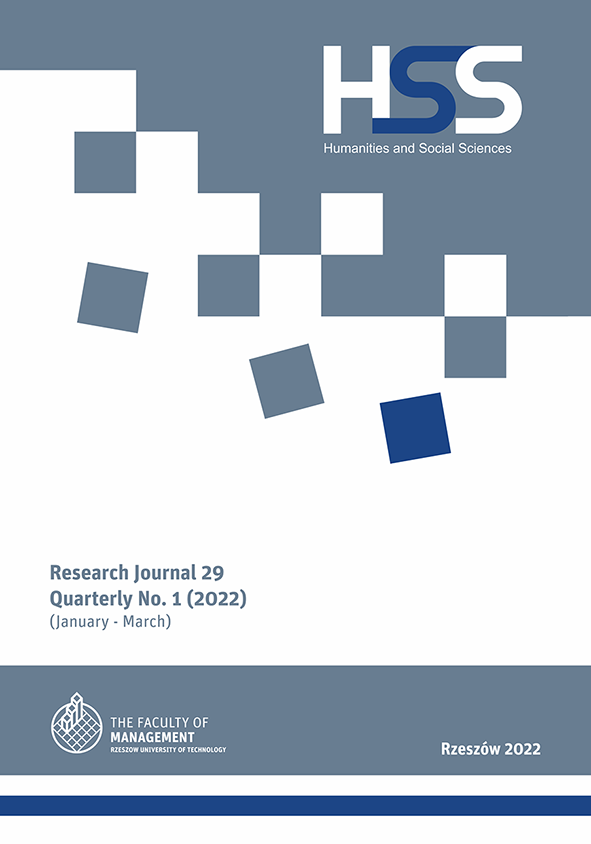Abstract
This paper aims to identify selected behavioral effects in people caused by the coronavirus pandemic. The research problem was formulated as a question: has people’s behavior changed after the announcement of restrictions related to the coronavirus pandemic in Poland? An analysis of the literature, the results of the authors’ own research, and participant observation confirmed the consistency of the results with the literature on behavioral economics. The results may be of cognitive importance in terms of backward induction, taking into account the behavior of the respondents. A selected description of actual behavior during the coronavirus situation is a novelty of the paper. The reader may become aware of differences in their own behavior and that of their family, colleagues, or others. They may also realize that we often react subconsciously and are guided by the suggestions of others.
References
Andrew, S. (2020). The psychology behind why toilet paper, of all things, is the latest coronavirus panic buy [Access: 1.05.2020]. Access on the internet: https://edition.cnn.com/2020/03/09/health/toilet-paper-shortages-novel-coronavirustrndl
Baggio, M. (2020). Here’s why society is reacting with panic to coronavirus [Access: 1.05.2020]. Access on the internet: https://www.weforum.org/agenda/2020/03/dont-panichow-human-behaviour-can-fuel-the-coronavirus/
Barzilay, J. (2016). Doctors’ Hand Hygiene Plummets Unless They Know They’re Being Watched, Study Finds [Access: 1.05.2020]. Access on the internet: https://abcnews.go.com/Health/doctors-hand-hygiene-plummets-watched-study-finds/story?id=39737505
Behave4. (2020). Behavioral Economics Assessment in Times of Pandemic [Access: 1.05.2020]. Access on the internet: https://www.behave4.com/post/behavioral-economicsassessments-in-times-of-pandemic
Behavioral economics assessments in times of pandemic (2020) [Access: 12.05.2020]. Access on the internet: https://www.behave4.com/behavioral-economics
Czechowska, K. (2014). Wybrane uwarunkowania podejmowania decyzji inwestycyjnych na rynkach nieruchomości – ujęcie behawioralne. „Studia i Prace Wydziału Nauk Ekonomicznych i Zarządzania ZN Uniwersytetu Szczecińskiego”, No. 36, Vol. 1.
Devlin, H. (2020). Behavioural scientists form a new front in the battle against coronavirus [Access: 2.04.2020]. Access on the internet: https://www.theguardian.com/world/2020/mar/13/behavioural-scientists-form-new-front-in-battle-against-coronavirus?
Dryhurst, S. et.al. (2020). Risk Perceptions of COVID-19 Around the World. “Journal of Risk Research”, 23(7–8). DOI: 10.1080/13669877.2020.1758193.
Dudkiewicz, W. (2004). Podstawy metodologii badań do pracy magisterskiej i licencjackiej z pedagogiki. Kielce: Wyd. Stachurski.
Fragkaki, I. et.al. (2021). Human responses to Covid-19: The role of optimism bias, perceived severity, and anxiety, “Personality and Individual Differences”, Vol. 176/110781. DOI: 10.1016/j.paid.2021.1107.
Glenn, .I (2021). ‘Fake news’ or trust in authorities? The problems of uncertainty at a time of medical crisis. “Journal of African Media Studies”, Vol. 13, No. 2, 1 June 2021. DOI: 10.1386/jams_00049_1.
Goda, G., Levy, M., Manchester, C., Sojourner, A. (2015). The Role of Time Preferences and Exponential-Growth Bias in Retirement Savings [Access: 29.08.2017]. Access on the internet: http://www.nber.org/papers/w21482
Grant, A., Rebele, R. (2020), A Trick to Stop Touching Your Face [Access: 15.07.2020]. Access on the internet: https://www.theatlantic.com/ideas/archive/2020/03/trick-stop-touchingyour-face/
Hommes, C. (2013). Behavioral Rationality and Heterogeneuos Expectations in Compex Economic System, Cambridge: Cambridge University Press.
Houdek, P., Koblovský, P., Vranka, M. (2021). The Challenge of Human Psychology to Effective Management of the COVID-19 Pandemic. “Soc”. 58 DOI: 10.1007/s12115-021-00575-x. http://straty-covid.pl [Access: 20.09.2021].
Huck, S., Zhou, J. (2011). Consumer behavioural biases in competition: A survey [Access: 15.12.2015]. Access on the internet: http://londoneconomics.co.uk/wp-content/uploads/2012/06/Consumer-behavioural-biases-in-competition-OFT1.pdf
Jordan, J., Yoeli, E., Rand, D. (2020). Don’t get it or don’t spread it? Comparing self-interested versus prosocially framed COVID-19 prevention messaging. DOI:10.31234/osf.io/yuq7x.
Kahneman, D., Slovic, P., Tversky, A. (1982). Judgment Under Uncertainty: Heuristics and Biases, Cambridge: University Press.
Kahneman, D., Tversky, A. (1973). Availability: A Heuristic for Judging Frequency and Probability, “Cognitive Psychology”, 5(2).
Kahneman, D., Tversky, A. (1974). Judgment under uncertainty: heuristics and biases, “Science. New Series”, Vol. 185.
Kehneman, D. (2012). Pułapki myślenia. O myśleniu szybkim i wolnym. Warszawa: Media Rodzina.
Lin, C., Jin, Y., Zhao, Q., Yu, S., Su, Y. (2021). Factors Influence Students’ Switching Behavior to Online Learning under COVID-19 Pandemic: A Push–Pull–Mooring Model Perspective. “Asia-Pacific Education Researcher”, 30(3). DOI 10.1007/s40299-021-00570-0.
Orlik, K. (2017). Makroekonomia behawioralna. Jak wyjaśnić zjawiska makroekonomiczne z wykorzystaniem ekonomii behawioralnej. Warszawa: CEDEWu.
Park, T., Ju, L., Ohs, J., Hinsley, A. (2021). Optimistic bias and preventive behavioral engagement in the context of COVID-19 “Research in Social & Administrative Pharmacy”, Vol 17, issue 1. DOI 10.1016/j.sapharm.2020.06.004.
Perrings, C. et al. (2014). Merging Economics and Epidemiology to Improve the Prediction and Management of Infectious Disease. “EcoHealth”, 11. DOI: 10.1007/s10393-014-0963-6.
Polowczyc, J. (2012). Zarządzanie strategiczne w przedsiębiorstwie w ujęciu behawioralnym. Poznań. Wyd. UE w Poznaniu.
Prieto, M. (2020). Cognitive biases in communication and prevention of COVID-19, “Revista Latina de Comunicacion Socia”, Issue 78. DOI: 10.4185/RLCS-2020-1483.
Ramsøy, T. (2020). The human biases behind the COVID-19 crisis [Access: 1.05.2020]. Access on the internet: https://www.thomasramsoy.com/post/the-human-biases-behind-the-covid19-crisis
Salwa, W. (2020). Asocial is the New Prosocial – Part 1 [Access: 12.07.2020]. Access on the internet: https://www.behave4.com/post/asocial-is-the-new-prosocial-part-1
Sarkar, T., Sarkar, A., Rabbany, M. i inni (2021). Evaluation of preventive, supportive and awareness building measures among international students in China in response to COVID-19: a structural equation modeling approach, “Global Health Research and Policy”, 6(1). DOI 10.1186/s41256-021-00192-5.
Smith, L., Klemm, C. (2020). Even as behavioural researchers we couldn’t resist the urge to buy toilet paper [Access: 12.08.2020]. Access on the internet: https://www.theguardian.com/commentisfree/2020/mar/05/even-as-behavioural-researchers-we-couldnt-resist-theurge-to-buy-toilet-paper
Szreder, M. (2004). Metody i techniki sondażowych badań opinii. Warszawa PWE.
Tawafak, R., Malik, S., Alfarsi, G. (2021). Impact of technologies during the COVID-19 pandemic for improving behavioral intention to use e-learning. “International Journal of Information and Communication Technology Education” 17(3), DOI 10.4018/IJICTE. 20210701.oa9.
The Behavioral Exonomics Guide (2021), ed. Samson, A., ISSN 2398-2020 [Access: 13.07.2021]. Access on the internet: https://www.behavioraleconomics.com
The Global Economy: on Track for Strong but Uneven Growth as COVID-19 Still Weighs, (2021). The World Bank, [Access: 11.09.2021]. Access on the internet: worldbank.org
Weston, D., Hauck, K., Amlôt, R. (2018). Infection prevention behaviour and infectious disease modelling: a review of the literature and recommendations for the future. “BMC public health”, 18(1).
Wnorowski, H., Niklińska, N. (2020). Coronaeconomy the beginning of newnormality? – in search of a new conceptual order, “Optimum. Studia Ekonomiczne”, 2(100). DOI: 10.15290/oes.2020.02.100.01.
www 1, https://epedagogika.pl/profilaktyka-i-wychowanie/samospelniajaca-sie-przepowiednia2347.html [Access: 12.07.2020].
www2, https://www.obserwatorfinansowy.pl/tematyka/makroekonomia/trendy-gospodarcze/nie-bylo-jeszcze-pandemii-o-takich-skutkach-gospodarczych/ [Access: 28.07.2020].


